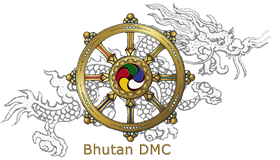Bhutanese Traditional Medicine & Art of Healing
As per Buddhist perspectives, the mind is creater of all the sickness, disease and poor health while our ‘karma’ is responsbile for all our happiness and suffering. Buddhism asserts that everything positive or negative that happens to us now is the result of all our previous deeds of not only in this lifetime but in previous lives as well. So to heal ourselves, we need to guard, check our own actions and Karma and this requires constant mindfulness and awareness of all the actions of our body, mind and speech. Buddhism is therefore has a holistic approach and as per this, all human beings have the ability to control our destiny, including the state of our mind and body. Each one of us has unlimited potential but it is important to recognize and develop that. Buddhism also believes that for permanent healing to occur, it is important to heal not only the current disease with medicines and other forms of treatment , but also eliminate the main cause of disease, which originate from mind and if we do not heal or purify the mind, the sicnkess and problem will keep on recurring. In order to heal the mind and subsequently body, we need to eliminate negative thoughts & their imprints and replace them with positive ones. The basic root of our problems and sickness is also selfishness that forces us to engage in negative actions that could be in form of jealousy, anger and greed. These negative feelings result in unhappy mind and state of being without peace, thus causing sickness.
Buddhist medicines are effective not merely because of its medicinal values but its uniqueness lies in the fact that during course of its preparation, these are blessed with extensive prayers and meditation, providing it power to heal and cure. It is believed that such medicine will either result in recovery, or, if the person is close to death, then die peacefully and painlessely. The blessed medicines and blessed water are used extensively during course of healing. The more spiritually powerful the person carrying out the blessing or healing practices, the healing is proportionally effective. In Bhutanese tradition, the Medicine Buddha ; Chenreyzig (Avalokishtevara – the Buddha of Compassion), or one of the long-life deities such as Amitabha are commonly remembered during such meditation process. Precisely the essential ingredients in the healing process, for both the person carrying out healing and the person being healed, are compassion, faith and pure mortality.
In historical records, Bhutan was also known as Lho Men Jong meaning, ‘Southern valley of medicinal herbs’, a name that still applies to this day. The Kingdom’s altitude variation from 200m to over 7500m has made it possible for plants of extremely different climate and environments to grown in the same country. Tropical and subtropical forests are found in the south, Temperate and even Mediterranean plants flourish in the valleys and very rare specimen grow upto 5000m. To date, more than 600 medicinal plants have been identified in the country and at least 300 of these are commonly used by traditional practioners.
The Bhutanese medicine is referred as Sowa Rigpa and its origin dates back to 17th century with arrival of Zhabdrung Ngawang Namgyal to Bhutan in 1616. In fact the Bhutanese tradition of Sowa Rigpa has developed independently of its Tibetan origin even though the basic texts are same. Precisely Bhutanese medicine is based on overall concept of universe & life and also Buddhism has a link in medical theory as per which only through enlightenment can wordly suffering end.
HOTELS IN THIMPHU
HOTELS IN PUNAKHA & WANGDUE
HOTELS IN GANGTEY
HOTELS IN TRONGSA
HOTELS IN BUMTHANG
HOTELS IN MONGAR
HOTELS IN TRASHIGANG
HOTELS IN SAMDRUP JONGKHAR
HOTELS IN PHUENTSHOLING
HOTELS IN HAA
HOTELS IN GELEPHU
HOTELS IN ZHEMGANG
RESTAURANTS IN PARO
RESTAURANTS IN THIMPHU
RESTAURANTS IN PUNAKHA
TOUR ITINERARIES
TREKKING ITINERARIES
SPECIAL INTERESTS TOURS
UNIQUE FESTIVALS & FAIRS
BLOG


